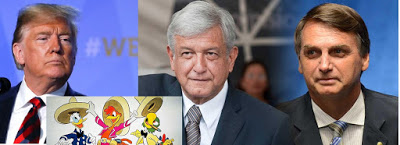Cartoonish figures... and Disney toons too With the incoming inauguration of Jair Bolsonaro in Brazil, the United States and the two largest countries in the Latin American region will have what the press has more or less universally and uncritically referred to as populist leaders in power. It has been very common in the press to compare Trump and Andrés Manuel López Obrador (AMLO) as right and left-wing populists. And although the term has not been applied as often to Bolsonaro, comparisons with Trump abound. Yet, while they do share certain characteristics, I would argue that populism is not one of them. The comparisons that make them all similar are at the end of the day caricatures.Admittedly populism is a complicated and somewhat fuzzy term. It has a complicated history, and
Topics:
Matias Vernengo considers the following as important: Brazil, Mexico, Populism, Trumponomics
This could be interesting, too:
Matias Vernengo writes The behavior of the nominal exchange rate between the Brazilian Real and the dollar in 2024
Matias Vernengo writes Serrano, Summa and Marins on Inflation, and Monetary Policy
Matias Vernengo writes Very brief note on the Brazilian real and the fiscal package
Matias Vernengo writes The second coming of Trumponomics
With the incoming inauguration of Jair Bolsonaro in Brazil, the United States and the two largest countries in the Latin American region will have what the press has more or less universally and uncritically referred to as populist leaders in power. It has been very common in the press to compare Trump and Andrés Manuel López Obrador (AMLO) as right and left-wing populists. And although the term has not been applied as often to Bolsonaro, comparisons with Trump abound. Yet, while they do share certain characteristics, I would argue that populism is not one of them. The comparisons that make them all similar are at the end of the day caricatures.
Admittedly populism is a complicated and somewhat fuzzy term. It has a complicated history, and many in the developed world associate it with the old agrarian movements in Russia and the US, and can be seen as somewhat progressive. Alternatively, in Latin America it has been more often than not associated with the rise of Peronism in Argentina, and the affinities with Italian corporatist and fascist ideologies leads many to see it as somewhat reactionary movement.
The economic definition of populism, or what Dornbusch and Edwards called macroeconomic populism, is even more problematic. They basically suggested that running fiscal deficits would fit the bill. That makes the list of possible populist leaders almost all encompassing, and devoid of any relevance. I won't try to solve the question of what a good definition of populism is, but I'll try to explain why to emphasize the similarities between the three might not be completely accurate, and might distort understanding of what to expect ahead. Mind you, on some level, one expects that populism should deliver something for the people and should be the opposite of oligarchic regimes.
Trump and Bolsonaro are clearly associated with conservative ideas while AMLO might be seen as a lefty (note, however, that according to Cuauhtémoc Cárdenas, the son of General Cárdenas and an icon of the left in Mexico, that is not correct; see here, in Spanish). While Trump was brought to power by the votes in the Rust Belt (in Michigan, Pennsylvania and Wisconsin) dissatisfied with Free Trade policies that have affected the region, in Brazil and Mexico a fight against corruption (real or perceived) played a more important role (something stimulated by US interests in LA). In Brazil, during the Workers' Party (PT) administration income inequality decreased (and real wages went up). A mediated-juridical coup brought down the government, and Bolsonaro represents the continuity with the coup. AMLO represents the dissatisfaction not just with the economic woes of Mexicans, but with the failures of democracy (including the return of PRI, Institutional Revolutionary Party, after two governments of PAN, National Action Party).
While Trump has at least promised an expansion of infrastructure spending (and the infamous wall of shutdown fame too), making him somewhat populist in Dornbusch's definition, both Bolsonaro and AMLO promise austerity and balanced budgets. While AMLO

